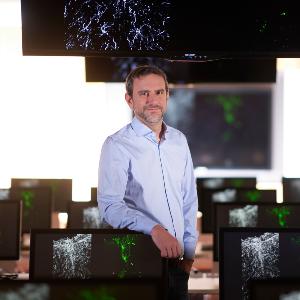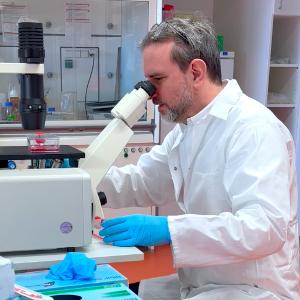Safe and Precise Control of Genes
15 Apr 2025
In a new study, Stefan Stricker and his team have developed a new CRISPR-based technology that activates genes without using DNA or viruses.
15 Apr 2025
In a new study, Stefan Stricker and his team have developed a new CRISPR-based technology that activates genes without using DNA or viruses.

© Jan Greune
Overcoming the Risks of Traditional Gene Therapy
Gene therapy holds immense potential for treating currently incurable diseases. However, conventional techniques often rely on viral vectors or DNA integration, which can lead to unwanted mutations and immune responses.
The newly developed CRISPR-based tool called dRNPs (dCas9-VPR ribonucleoprotein complexes) overcomes these challenges. Instead of introducing genetic material, it delivers lab-produced CRISPR activation proteins directly into cells, eliminating the risks associated with viral or DNA-based methods.
Introducing dRNPs: A DNA- and Virus-Free Solution
Using this approach, the team of Prof Stefan Stricker (BMC Ludwig-Maximilians-Universität München und Helmholtz Zentrum München) achieved highly efficiency gene activation in various human cell types – including stem cells, differentiated cells, and primary cells. The system proved both rapid and transient, with the ability to activate even hard-to-reach developmental genes within hours. These features make it particularly promising for therapeutic applications.
A key strength of dRNPs is their flexibility: the technology enables the simultaneous activation of multiple genes, making it a powerful tool for complex processes such as cellular reprogramming. In one compelling demonstration, researchers used dRNPs to trigger neuronal gene expression in non-neuronal cells – effectively generating new neurons. This capability opens new possibilities for regenerative medicine and cell-based therapies.
A New Standard in Gene Modulation
By eliminating the risks associated with viral vectors and DNA integration, dRNPs establish a new benchmark for safety and precision in gene modulation. The novel method paves the way for safer, more efficient therapies, and provides researchers with a powerful tool to explore gene function, model disease, and drive forward the future of personalized medicine.
Further insights into the research work of Prof. Stefan Stricker can be found in our short video (18.03.2025).
Publication: Schmidt et al., 2025: Efficient DNA- and virus-free engineering of cellular transcriptomic states using dCas9 ribonucleoprotein (dRNP) complexes. Nucleic Acid Research.
Source: Helmholtz Zentrum München
dRNPs are a completely new option to treat cells in a disease context. Since the technology does not induce mutations and is DNA- and virus-free, we have great hopes for its future application in therapeutic contexts.Prof Stefan Stricker, Senior author of the study
